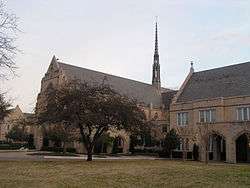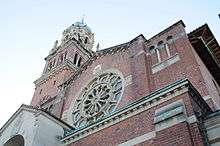ECO: A Covenant Order of Evangelical Presbyterians
| ECO: A Covenant Order of Evangelical Presbyterians | |
|---|---|
.jpg) | |
| Classification | Protestant |
| Orientation | Reformed Evangelical |
| Polity | Presbyterian |
| Leader | Dana Allin[1] |
| Associations | World Communion of Reformed Churches (provisional member),[2] |
| Headquarters | Goleta, California |
| Origin | 2012 |
| Separated from | Presbyterian Church (USA) |
| Congregations | 367 congregations and 500+ pastors [3] |
| Members | 121,000 |
| Official website |
eco-pres |
ECO: A Covenant Order of Evangelical Presbyterians is an evangelical Presbyterian denomination in the United States. As a Presbyterian church, ECO adheres to Reformed theology and Presbyterian polity. It was established in 2012 by former congregations and members of the Presbyterian Church (USA), abbreviated PC(USA). Dissatisfaction with the declining membership of the PC(USA) along with growing denominational disputes over theology and bureaucracy[4] led to the founding of ECO. As of February 2018, ECO has 367 congregations and over 500 pastors.[3][5][6]
Name
"ECO" is not an acronym but is part of the denomination's full name according to the denomination.[7] The name represents ECO's three-fold commitment to make disciples of Jesus Christ (Evangelical), connect leaders through accountable relationships and encourage collaboration (Covenant), and commit to a shared way of life together (Order). The name "ECO" also speaks to the commitment to "strengthen the 'ecosystems' of local churches" by providing the environment and resources to produce healthy churches.[8]
History
Plans for establishing what would become ECO were initiated in January 2012 by the Fellowship of Presbyterians (now The Fellowship Community), an umbrella organization of theologically conservative Presbyterians in the Presbyterian Church (USA).[9][10] ECO was conceived of as an alternative to the Presbyterian Church (USA), which theologically conservative Presbyterians considered too liberal. While other conservative Presbyterian churches in the United States existed, most of these, with the exception of the Evangelical Presbyterian Church, did not permit female clergy.[11] According to denominational website, ECO has 367 congregations.[3]
Beliefs

The beliefs of ECO are expressed in a statement of Essential Tenets.[12] The Essential Tenets affirm that the Old and New Testaments are infallible and authoritative, containing everything necessary for faith and life.[13] In common with other Christians, ECO believes in the doctrine of the Trinity and the Incarnation—the "two central Christian mysteries"—and that the only hope of salvation and adoption as children of God is God's grace in Jesus Christ.[14] Reflecting its Reformed heritage, ECO believes that, as a consequence of the Fall of Man, humans lost free will and are incapable of turning towards God. Salvation is made possible by only the irresistible grace of God, who chose the elect before the world was created.[15]
The Essential Tenets explain that within the church, God's grace is received through the preaching of the Word of God, the administration of the sacraments of baptism and the Lord's Supper, and church discipline.[15] ECO practices open communion.[16] The offices of teaching elder, deacon, and ruling elder correspond to Christ's three-fold office of prophet, priest, and king. Because it believes that both men and women are called to all ministries in the church, ECO ordains women. All church members are to embody the three-fold offices in their daily lives by sharing and enacting the Gospel and extending the lordship of Jesus Christ.[17] According to the Essential Tenets, progressive sanctification is an expected characteristic of a Christian life. This includes a life of prayer, regular self-examination (especially guided by the Ten Commandments), and sincere confession of sin. According to the Essential Tenets, Christians are to maintain lives of chastity either through celibacy or marriage between a man and a woman.[18]
While ECO recognizes the Bible as the primary authority governing matters of faith and doctrine, the Essential Tenets affirm the Book of Confessions (editions prior to the revision of the Heidelberg Catechism) as a faithful explanation of scriptural truth and a subordinate standard of doctrine.[19] The Book of Confessions, inherited from the Presbyterian Church (USA), includes the following creeds, confessions, and catechisms:[20]
- Nicene Creed
- Apostles' Creed
- Scots Confession
- Heidelberg Catechism
- Second Helvetic Confession
- Westminster Confession of Faith with the Shorter and Larger Catechisms
- Barmen Declaration
- Confession of 1967
- A Brief Statement of Faith (written in 1983 for the creation of the Presbyterian Church (USA))
Structure

ECO follows presbyterian polity. A synod is the chief decision making body of the denomination.[21] Congregations are organized into 22 geographical presbyteries:
- East Central Presbytery (Kentucky, West Virginia, Virginia and Maryland)
- Presbytery of Florida
- Great Lakes Presbytery (Michigan, Ohio)
- Presbytery of Texas (Texas, Louisiana)
- Presbytery of the West (Idaho, Montana, Wyoming, Nevada, Utah, Colorado, New Mexico)
- Presbytery of Northern California
- Presbytery of the Northwest (Oregon and Washington)
- Presbytery of Southern California
- Presbytery of Alaska
- Presbytery of the South (Tennessee, Mississippi, Alabama, Georgia)
- Presbytery of the Rivers of Life (western Pennsylvania)
- Upper Midwest Presbytery (North Dakota, South Dakota, Minnesota, Nebraska and Iowa).
- Bluewater Presbytery (California counties of Alameda, Contra Costa, Solano, Marin, Napa, Sonoma, San Francisco, San Mateo, Santa Clara, Santa Cruz, Monterey, San Benito, and the state of Hawaii.)
- Mission Presbytery (San Luis Obispo, Santa Barbara, Ventura and Kern County, and Western and Northern Areas of LA County)
- Presbytery of Mid America (Kansas, Missouri, Oklahoma, Arkansas)
- Heritage Presbytery (Delaware, New Jersey, Southeast Pennsylvania)
- Cornerstone Presbytery (New York, Northeast Pennsylvania)
- Northeast Coast Presbytery (NYC area (including northern New Jersey) to Maine along NE Coast, Vermont)
- Presbytery of North Carolina
- Hope Presbytery (Arizona)
- Presbytery of the Harvest (Illinois, Indiana, Wisconsin)
- Presbytery of South Carolina[22]
Statistics
As of 1 July 2017 there are 347 congregations and 517 pastors who are a part of ECO.[3]
National Gatherings
ECO's annual Synod business meeting also serves as a major leadership training event for church leaders and members. Prominent guest speakers at the 2018 Gathering included Ed Stetzer, Kyle Strobel, and former Secretary of State Condoleezza Rice.[23]
Notable congregations
- Christ Presbyterian Church (Edina, Minnesota)
- Community Presbyterian Church (Ventura, California)
- First Presbyterian Church (Colorado Springs, Colorado)
- First Presbyterian Church (Greenville, SC)
- First Presbyterian Church (Mount Holly, New Jersey)
- First Presbyterian Church (Tacoma, Washington)
- Grace Presbyterian Church (Houston, Texas)
- Highland Park Presbyterian Church (Dallas, Texas)
- Menlo Park Presbyterian Church (Menlo Park, California)
- Memorial Drive Presbyterian Church (Houston, Texas)
- Grace Church (Bethlehem, Pennsylvania)
- Bonhomme Evangelical Presbyterian (Chesterfield, Missouri)
- St. Andrews Presbyterian Church (Newport Beach, California
- First Presbyterian Church (Houston, Texas)
- First Presbyterian Church (San Antonio, Texas)
- First Presbyterian Church (Corpus Christi, Texas)
- Cornerstone Presbyterian Church (Minot, North Dakota)
- Walnut Creek Presbyterian Church (Walnut Creek, California)
- Waters Edge Presbyterian Church (El Segundo, California)
References
- ↑ De Guzman, Zaimarie (May 26, 2012). "Fort Pierce pastor looking forward to new challenge as head of Evangelical Covenant Order". tcpalm.com. Scripps Treasure Coast Newspapers. Retrieved January 2, 2015.
- ↑ "ECO received as a member-church of WCRC". The Layman Online. June 3, 2013. Retrieved June 5, 2013.
- 1 2 3 4 http://www.eco-pres.org/membership/
- ↑ "Who We Are / Our Story | ECO Presbyterian". eco-pres.org. Retrieved 2018-05-03.
- ↑ http://fpchouston.org/am-site/media/session-update-denominational-affiliation-results.pdf
- ↑ http://www.christianpost.com/news/pcusas-eighth-largest-member-church-votes-leave-join-conservative-presbyterian-denomination-166638/
- ↑ "Who We Are / Our Story | ECO Presbyterian". eco-pres.org. Retrieved 2016-07-26.
- ↑ "Our Name", ECO: A Covenant Order of Evangelical Presbyterians. Accessed June 5, 2013.
- ↑ "Our Story", The Fellowship of Presbyterians. Accessed June 5, 2013.
- ↑ (U.S.A.), Presbyterian Church. "Presbyterian Church (U.S.A.) - News & Announcements - Fellowship, Presbyterians for Renewal plan merger that would offer a new home to evangelicals". www.pcusa.org. Retrieved 2016-04-22.
- ↑ Daniel Burke (January 21, 2012), "Conservative Presbyterians in U.S. launch new denomination", The Presbyterian Outlook. Accessed June 5, 2013.
- ↑ Essential Tenets and Confessional Standards. ECO:A Covenant Order of Evangelical Presbyterians. Accessed March 17, 2017.
- ↑ Essential Tenets and Confessional Standards, p. 2. Accessed March 17, 2017.
- ↑ Essential Tenets and Confessional Standards, pp. 1–4. Accessed March 17, 2017.
- 1 2 Essential Tenets and Confessional Standards, p. 4. Accessed March 17, 2017.
- ↑ ECO Polity and Discipline, ECO: A Covenant Order of Evangelical Presbyterians, p. 5. Accessed March 17, 2017.
- ↑ Essential Tenets and Confessional Standards, pp. 4–5. Accessed March 17, 2017.
- ↑ Essential Tenets and Confessional Standards, p. 5. Accessed March 17, 2017.
- ↑ Essential Tenets and Confessional Standards, pp. 2,7. Accessed March 17, 2017.
- ↑ Essential Tenets and Confessional Standards, p. 6. Accessed March 17, 2017.
- ↑ ECO Polity and Discipline, p. 13. Accessed March 17, 2017.
- ↑ "Presbyteries | ECO Presbyterian". eco-pres.org. Retrieved 2018-05-03.
- ↑ "ECO Natl. Gathering 2018 | First Presbyterian Houston". fpchouston.org. Retrieved 2018-05-03.